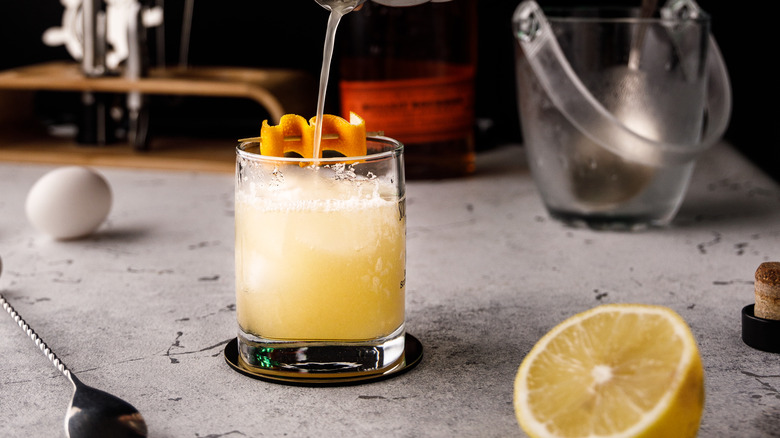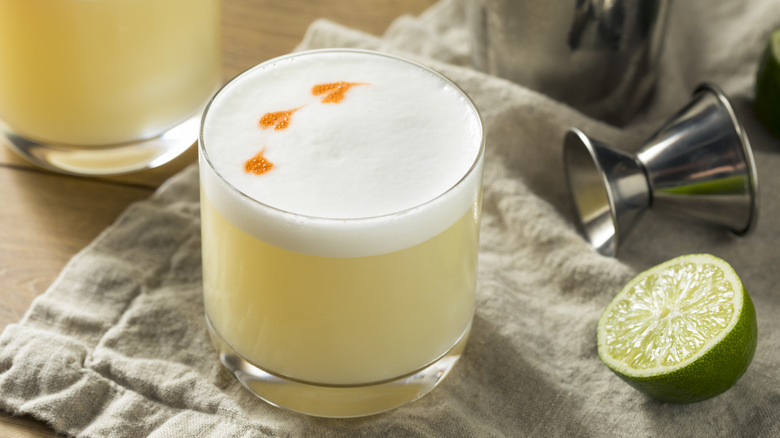Whiskey Sour Vs Whiskey Fix: What's The Difference
You can find whiskey in everything these days, from bourbon-brined turkey to whiskey butterscotch sauce. Food aside, whiskey has become quite a versatile liquor. From the spicy cinnamon-infused whiskey, Fireball, to the sweeter peanut butter-flavored Screwball whiskey, there's sure to be a flavor in this alcohol category to satisfy even the pickiest of taste buds.
This recent whiskey boom has mixologists going back to the drawing board to revamp classic whiskey cocktails. But because of the prohibition and innovative nature of the spirits industry, many classic recipes have been distorted over time. As bartenders rediscover and reinterpret classic cocktails, there remains some confusion over the difference between a whiskey sour and a whiskey fix.
Traditional versions of the sour and fix cocktails were nearly identical, being both descended from fruit juice-heavy, refreshing punch-style cocktails. An early recipe for a basic punch cocktail goes, "one part sour, one part sweet, two parts strong, two parts weak," respectively translating to something like lemon juice, sugar, brandy, and water.
Cocktail pioneer Jerry Thomas popularized punches when he began tinkering with the ratios of recipes, which gave us one of the earliest known recipes for fixes and sours from his book "How to Mix Drinks." This began the "shortening" of punches, meaning that as these cocktails evolved to be more sour and boozy than sweet and refreshing, their accompanying glasses changed from tumblers and pints to rocks or coup glasses.
Fix origins
As published in the Jerry Thomas Bar-tenders Guide (1887), one of the first recorded recipes of the whiskey fix details "one large teaspoon of powdered white sugar dissolved in a little water," juice from one-half lemon, and a glass of whiskey with shaved ice all stirred together. The book also features a whiskey sour recipe that mirrors a fix cocktail, except for the additional step of shaking, straining, and serving the cocktail in a claret glass. In one of their earliest iterations, the difference between a sour and fix is simply ice. But these cocktails have changed over time, and gone through waves of popularity and simplicity that have altered what we now recognize as the various differences between the two classic drinks.
During its day near the end of the 19th century, the fix cocktail consisted of spirit, citrus juice, simple syrup, pineapple syrup, green Chartreuse, and a splash of seltzer served over ice (courtesy of Imbibe). The drink has come a long way, but even when glamourized the whiskey fix retains the distinguishing fruit juice and on-the-rocks qualities of a punch. Nowadays, the fix has dwindled in popularity, and most bars serve a simplified version of the short punch (via Difford's Guide) with just spirit, lemon juice, additional fruit juice, and simple syrup served over ice, much more akin to a Bee's Knees (gin) or Lemon Drop (vodka).
Legacy of sours
The whiskey sour on the other hand has evolved into one of the most recognizable cocktails in the world, and as such has been both ultra-simplified and artfully elaborated. Whiskey sours are such a prominent part of the cocktail culture that it's essential for bars to include sour mix on tap while grocery stores sell it by the mix by the half-gallon so all you need to do is add whiskey, shake, and serve. But this sour mix represents the most basic version of the cocktail, the version that only has spirit, citrus, and sugar. Whiskey sours have evolved far beyond the scope of classic punch drinks with the addition of some aromatic and effervescent ingredients.
Some early innovations to the whiskey sour featured a splash of sparkling water, resembling a whiskey fizz, while others adapted the cocktail by incorporating egg white to give the drink a frothy, effervescent foam and lush texture (via Liquor). The egg white became prominent in whiskey sours because of their traditional omission of ice, which would otherwise hinder the egg white from frothing. With the addition of egg white came the complimentary use of aromatic bitters for a touch of spice and garnish. Some say that only true whiskey sours have egg white and that anything else is either more akin to a whiskey fizz or whiskey fix. But whiskey sours are so essential to mixology, that the term can really extend to anything that features spirit, citrus, and sugar.


